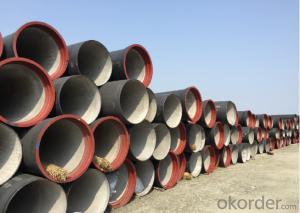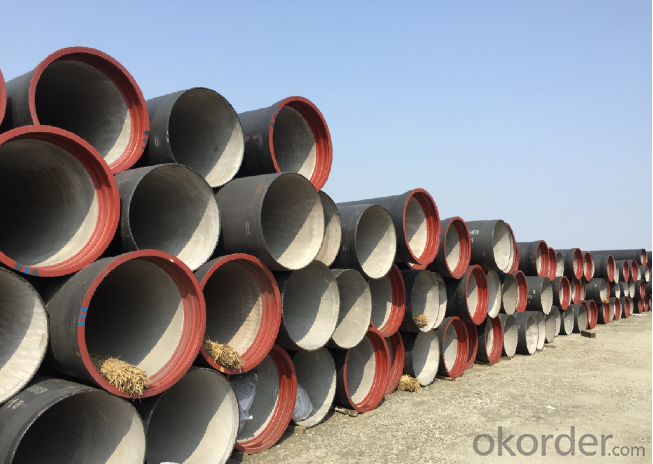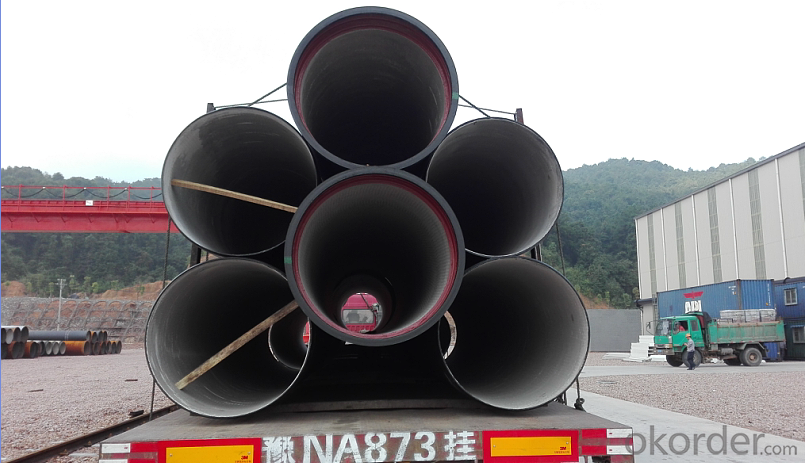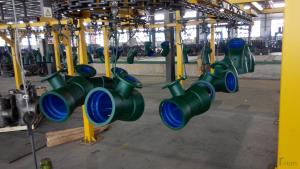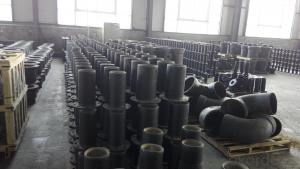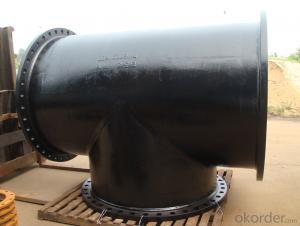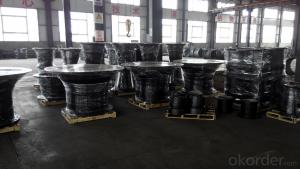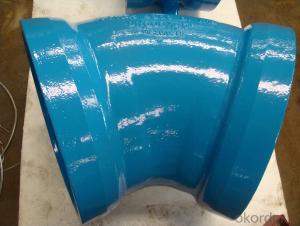Ductil cast iron pipes, iron pipes, Ductil cast
- Loading Port:
- Xiamen
- Payment Terms:
- TT OR LC
- Min Order Qty:
- 10 pc
- Supply Capability:
- 1000 pc/month
OKorder Service Pledge
OKorder Financial Service
You Might Also Like
Ductile iron is manufactured by melitng, spheroidization, inoculation, and pouring. The manesium alloy addition produces a remarkable change in the mocrostructure by causing the carbon in the iron to aasume the spheroidal shapes. The spheroidal praphites are using the silicon alloy to inoculation treatment, at the same time, producing a finer grained iron matrix in the surrounging ferrite structure. As a result of this remarkable change, a far stonger, tougher and ductile material is obtained.
Our product have more than 30 years experience in waterworks industry, voasting advanced concepts and tremendous technological strength. We are dediate to design, manufacture and management of large diameter ductil cast iron pipes, precision casting, water supply equipment, wastewater treatment and seawater desalination. So if you have similar project, we can offer you a complete resolution.
Small quantity purchase can be shipped by containers, special size or big quantity should be shipped by bulk steak.
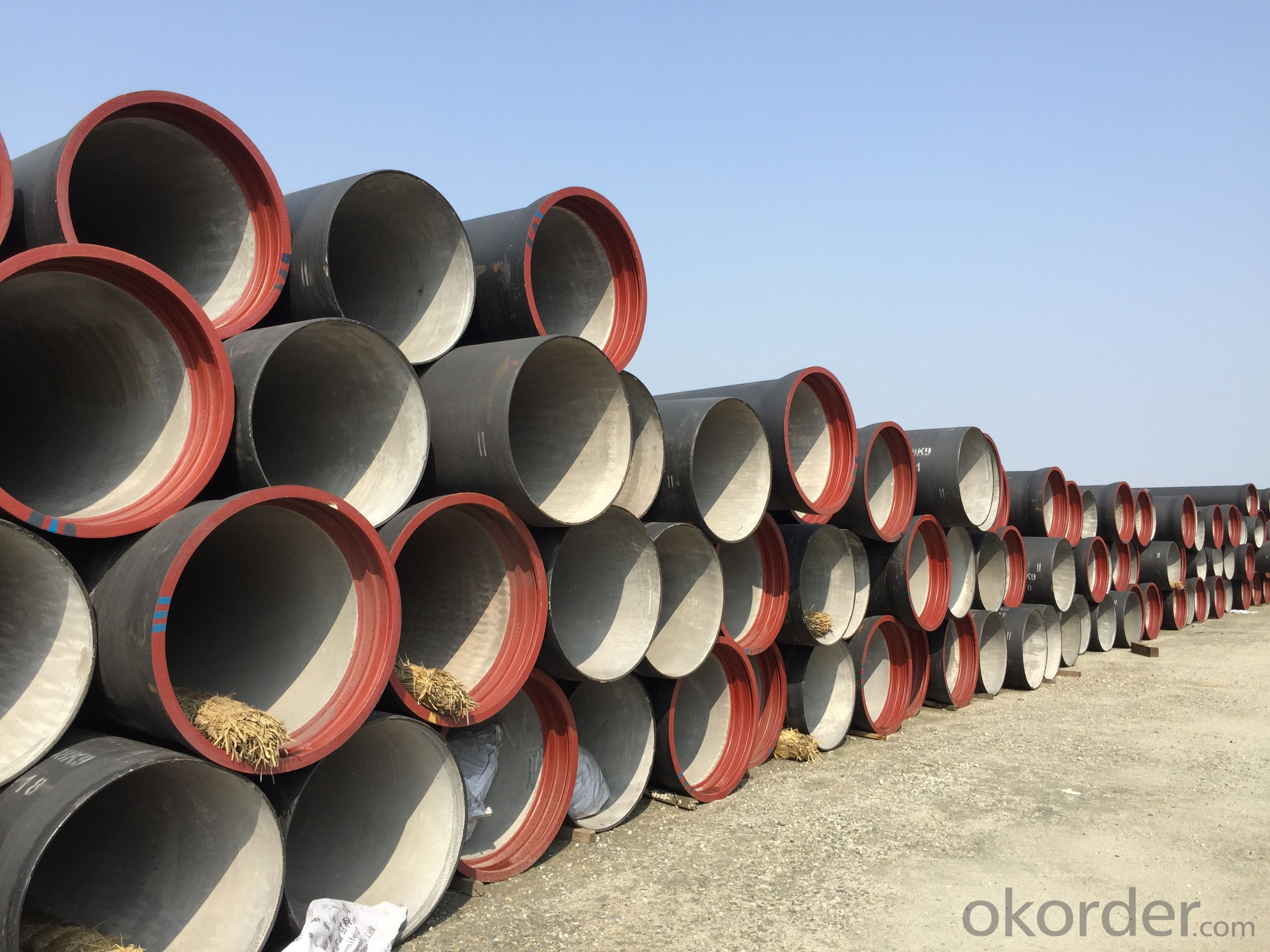
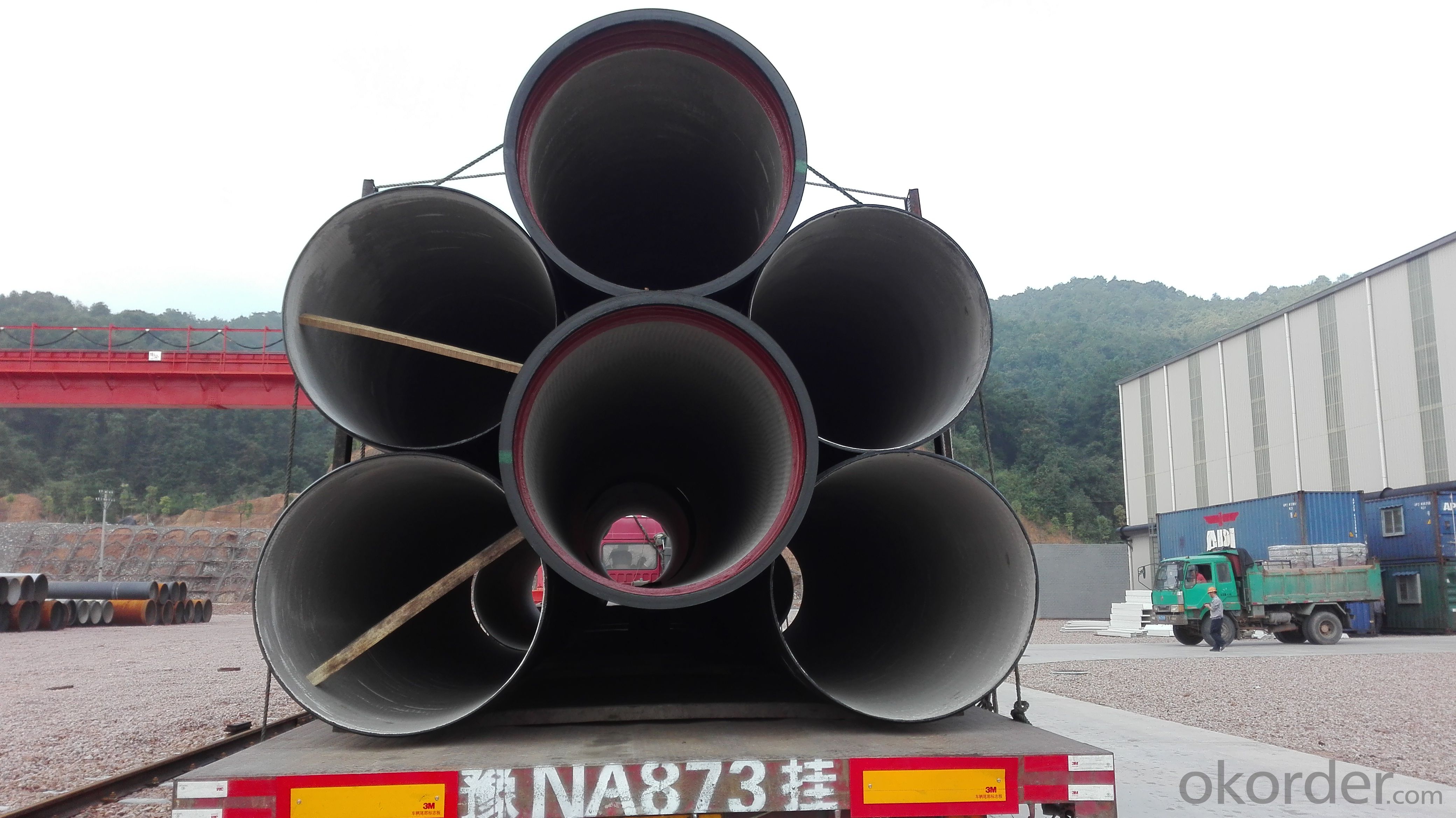
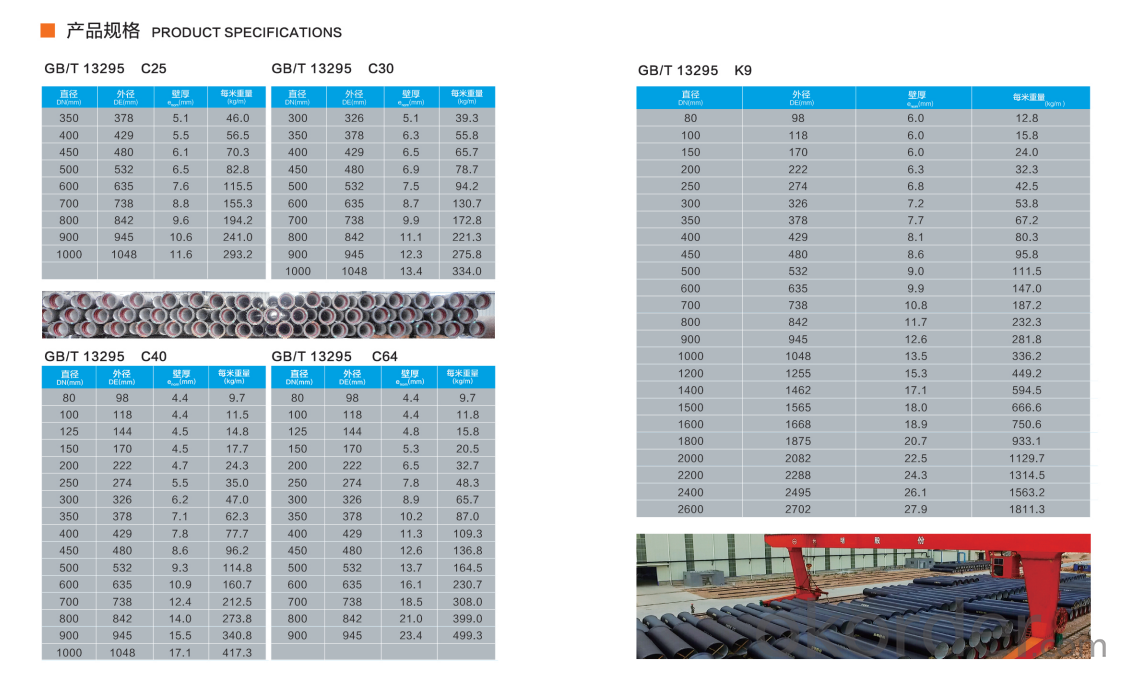
- Q: Are ductile iron pipes resistant to alkali attacks?
- Ductile cast iron, commonly used in ductile iron pipes, has demonstrated its remarkable resistance to alkali attacks. This is achieved through the inclusion of specific chemical compositions that provide exceptional corrosion resistance. Alkali attacks, which arise from the interaction between alkaline substances and metals or other materials, are effectively countered by the dense and protective oxide film present on both the inner and outer surfaces of ductile iron pipes. This oxide film forms naturally over time and possesses a composition and structure that offer excellent resistance to alkali attacks. Moreover, to further enhance their ability to withstand corrosion and chemical reactions, ductile iron pipes are frequently coated with various protective layers, such as epoxy or zinc. It should be emphasized that although ductile iron pipes exhibit a high resistance to alkali attacks, the severity and concentration of the alkali substances can still impact their overall performance. In extreme instances, where there are exceedingly high concentrations of alkali substances or prolonged exposure to aggressive alkaline environments, some damage may occur to the protective layers of the pipes. Nonetheless, within normal conditions and acceptable parameters, ductile iron pipes are widely regarded as possessing outstanding resistance to alkali attacks.
- Q: What is the expected joint restraint method for ductile iron pipes?
- The expected joint restraint method for ductile iron pipes is typically mechanical joints or push-on joints. These joints provide a secure and leak-free connection between the pipes, ensuring the stability and integrity of the pipeline system. Mechanical joints involve the use of rubber gaskets and bolts to tightly seal the joint, while push-on joints utilize a groove and rubber gasket system to create a watertight seal. Both methods offer excellent joint restraint capabilities, allowing for the effective transmission of fluids or gases through the pipeline without the risk of joint separation or failure. Additionally, these joint restraint methods also facilitate ease of installation and maintenance, making them a preferred choice for ductile iron pipe systems.
- Q: What is the expected external coating for ductile iron pipes?
- Typically, when it comes to ductile iron pipes, an expected external coating is applied to the pipe's outer surface. This coating serves as a protective layer, preventing corrosion and increasing the pipe's lifespan. Some common types of coatings for these pipes are polyethylene, polyurethane, and epoxy coatings. These coatings act as a barrier, shielding the pipe from contact with corrosive substances like soil, water, and chemicals. The choice of coating depends on factors such as the intended use, soil conditions, and required level of corrosion protection. Ultimately, the purpose of the expected external coating for ductile iron pipes is to ensure their longevity and durability in various environmental conditions.
- Q: Can ductile iron pipes be used for wastewater reuse projects?
- Yes, ductile iron pipes can be used for wastewater reuse projects. Ductile iron is a strong and durable material that can withstand the corrosive nature of wastewater. It is commonly used in wastewater treatment plants and distribution systems for its ability to handle high-pressure and heavy loads. Additionally, ductile iron pipes have a long lifespan, making them a reliable choice for wastewater reuse projects.
- Q: Can ductile iron pipe be used for cooling water systems?
- Yes, ductile iron pipe can be used for cooling water systems. Ductile iron pipe has excellent corrosion resistance, high tensile strength, and is capable of withstanding high-pressure conditions, making it suitable for various applications, including cooling water systems. Its durable and versatile nature allows it to effectively transport and distribute cooling water without the risk of leakage or failure. Additionally, ductile iron pipe is known for its long service life and low maintenance requirements, making it a cost-effective choice for cooling water systems.
- Q: Do ductile iron pipes require pressure testing before installation?
- Yes, ductile iron pipes typically require pressure testing before installation to ensure their integrity and ability to withstand the required pressure and flow conditions.
- Q: Can ductile iron pipe be recycled?
- Yes, ductile iron pipe can be recycled. It is a highly recyclable material that can be melted down and reused in the production of new ductile iron products. Recycling ductile iron pipe helps reduce waste and conserves natural resources.
- Q: Are there any specific standards or regulations for ductile iron pipe?
- Yes, there are specific standards and regulations for ductile iron pipe. The American Water Works Association (AWWA) has established standards such as AWWA C151 for ductile iron pipe, which outlines the minimum requirements for manufacturing, testing, and installation. Additionally, various countries and regions may have their own specific regulations and standards for ductile iron pipe to ensure its quality and performance in different applications.
- Q: How are ductile iron pipes different from cast iron pipes?
- Ductile iron pipes are different from cast iron pipes in terms of their composition and properties. Ductile iron pipes are made from a type of cast iron that has been treated with magnesium to improve its strength and flexibility. This makes ductile iron pipes more durable, impact-resistant, and less prone to cracking or breaking compared to traditional cast iron pipes. Additionally, ductile iron pipes have a higher tensile strength, allowing them to withstand higher internal and external pressures. In summary, ductile iron pipes are a more modern and advanced version of cast iron pipes, offering improved performance and longevity.
- Q: How do ductile iron pipes perform in high-pressure applications?
- Ductile iron pipes are known for their exceptional strength and durability, making them highly suitable for high-pressure applications. These pipes are designed to withstand immense internal and external pressures, making them well-suited for underground or above-ground installations where high-pressure conditions are expected. One of the key advantages of ductile iron pipes in high-pressure applications is their ability to resist cracking or bursting. The inherent ductility of the material allows it to absorb and distribute the pressure evenly, minimizing the risk of failure under high-pressure conditions. This makes ductile iron pipes a reliable choice for water supply systems, oil and gas pipelines, and other applications where the pipe is subjected to significant pressure. Additionally, ductile iron pipes have excellent corrosion resistance properties, which further enhances their performance in high-pressure environments. The pipes are typically coated with a protective layer, such as cement mortar or epoxy, which acts as a barrier against corrosion. This protective coating prevents the formation of rust or scale inside the pipe, ensuring a smooth flow and maintaining the structural integrity even under high-pressure conditions. Furthermore, ductile iron pipes have a high tolerance for external loads, such as soil pressure, traffic loads, or other external forces. This strength enables them to withstand the additional stress that may be present in high-pressure applications, ensuring the long-term reliability and performance of the pipe system. Overall, ductile iron pipes offer exceptional performance in high-pressure applications. Their strength, durability, corrosion resistance, and ability to withstand external loads make them a reliable choice for various industries and infrastructure projects where high-pressure conditions are a concern.
Send your message to us
Ductil cast iron pipes, iron pipes, Ductil cast
- Loading Port:
- Xiamen
- Payment Terms:
- TT OR LC
- Min Order Qty:
- 10 pc
- Supply Capability:
- 1000 pc/month
OKorder Service Pledge
OKorder Financial Service
Similar products
Hot products
Hot Searches
Related keywords
